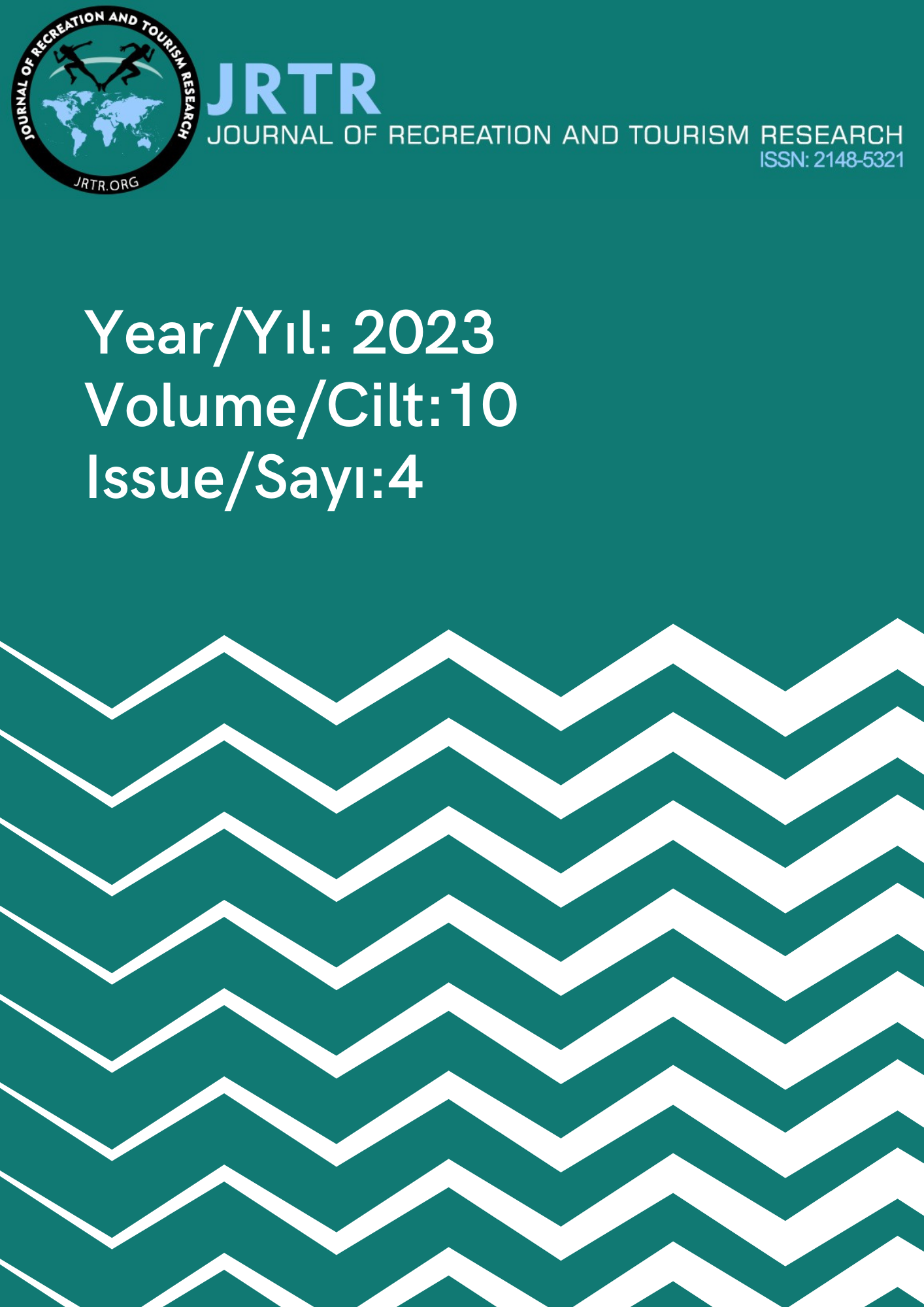The Effect Level of Social Media on the Development of Gastronomy Tourism in Türkiye
DOI:
https://doi.org/10.5281/zenodo.10443068Keywords:
Gastronomy Tourism, Social Media, Impact LevelAbstract
Travels for culinary purposes have expanded in recent years, ensuring that gourmet goods associated with tourism sites come to the fore. As is well known, social media platforms are one of today's most successful communication aspects. As a result, social media platforms might be the most practical and convenient method to learn about a destination's culinary components. In this regard, the study's goal is to assess the impact of social media use on culinary tourism. The research findings were gathered by distributing a questionnaire to 200 Yozgat residents and using social media. The statistical values of the demographic features of the participants, as well as their perspectives on the amount of effect of social media tools on culinary tourism, were included in the analysis of the study data. T-test and Anova test analysis findings are given for the variables of demographic features of the participants and the amount of influence of social media tools on culinary tourism. According to the findings of the study, the majority of participants use Instagram to increase gastronomic interest, and female participants have a greater level of social media impact than male participants. Furthermore, it has been discovered that primary school graduates and the jobless have a stronger influence on social media.
Downloads
References
Chua, A.Y.K. ve Banerjee, S. (2015). How Businesses Draw Attention On Facebook Through İncentives, Vividness And İnteractivity”, International Journal of Computer Science, 42(3), 275-281.
Cizrelioğulları, M. N., Altun, Ö., ve Barut, P. (2020). Sosyal Medya Uygulamalarını Kullanan Z Kuşağının Gastronomi Turizmi Açısından İncelenmesi, Gastronomi Araştırmaları. Ankara: İksad Yayınevi.
Djafarova, E. ve Rushworth, C. (2017). Exploring The Credibility Of Online Celebrities’ Instagram Profiles İn İnfluencing The Purchase Decisions Of Young Female Users, Computers in Human Behavior, Vol. 68, 1-7, doi: 10.1016/j.chb.2016.11.009.
Doğan, M., Pekiner, B., ve Karaca, E. (2018). Sosyal Medyanın Turizm ve Turist Tercihlerine Etkisi: Kars-Doğu Ekspresi Örneği. Seyahat ve Otel İşletmeciliği Dergisi, 15 (3): 669-683.
Duman, M. Ş., Akmeşe, K. A. ve Sormaz, Ü. (2019). Üniversite Öğrencilerinin Yöresel Mutfak Tercihlerinde Sosyal Medyanın Etkisi, Journal of Tourism and Gastronomy Studies, 7(4), 3174-3188.
Eşitti, Ş. ve Işık, M. (2015). Sosyal Medyanın Yabancı Turistlerin Türkiye’yi Tatil Destinasyonu Olarak Tercih Etmelerine Etkisi, Karadeniz Uluslararası Bilimsel Dergisi, 27, 11-30.
İmre, N. (2020). Turizm Sektöründe Sosyal Medya Kullanımı Üzerine Bir Değerlendirme, Türk Turizm Araştırmaları Dergisi, 4(2): 1655-1670.
Karasar, N. (2006). Bilimsel Araştırma Yöntemleri (16. Baskı). Ankara: Nobel Yayın Dağıtım.
Kodjamanis, A. ve Angelopoulos S. (2013). Consumer Perception And Attitude Towards Advertising On Social Networking Sites: The case of Facebook, II. International Conference on Communication, Media, Technology and Design, Famagusta – North Cyprus, 53-58.
Oğan, Y. ve Durlu Özkaya, F. (2021). Artvin’i Ziyaret Eden Turistlerin Gastronomi Deneyimleri Üzerine Bir İnceleme. Güncel Turizm Araştırmaları Dergisi, 5(2), 211-227.
Pekerşen, Y.,ve Kaplan, M. (2020). Tüketicilerin Yeme İçme Alışkanlıkları Ve Yiyecek-İçecek İşletmesi Tercihlerinde Sosyal Medya Kullanımının Rolü: Muğla Örneği, İşletme Araştırmaları Dergisi, 12 (3), 2362-2381 https://doi.org/10.20491/isarder.2020.981
Saboo, S.B., Kumar, V. ve Ramani, G. (2016).“Evaluating the impact of social media activities on human brand sales”, International Journal of Research in Marketing, Vol. 33 No. 3, 524-541, doi: 10.1016/j. ijresmar.2015.02.007.
Sebastian, J., ve Murali, T.(2017). Influence of Social Media on Culinary Tourism with Special Focus on Chennai City, Cardinal Cleemis School of Management Studies, Trivandrum, 1-9.
Tabachnick, B. G. ve Fidell, L. S. (2013). Using Multivariate Statistics (Sixth edition). United States: Pearson Education.
TUİK, (2022). https://data.tuik.gov.tr/Bulten/Index?p=Turizm-Istatistikleri-IV.Ceyrek:-Ekim-Aralik-ve-Yillik,-2022-49606 Erişim Tarihi: 20.02.2023
Ural, A. ve Kılıç, İ. (2013). Bilimsel Araştırma Süreci ve SPSS ile Veri Analizi. Ankara: Detay Yayıncılık.
Vukolic, D., Gajić, T. ve Penic, M. (2022). The effect Of Social Networks On The Development Of Gastronomy – The Way Forward To The Development Of Gastronomy Tourism İn Serbia, Journal of Tourism Futures, Ahead-Of-Print. https://doi.org/10.1108/JTF-01-2022-0034
Yuan, Y., Chan, C.S., Eichelberger, S., Ma, H. ve Pikkemaat, B. (2022). The Effect of Social Media On Travel Planning Process By Chinese Tourists: The Way Forward To Tourism Futures, Journal of Tourism Futures, 1-20, doi: 10.1108/JTF-04-2021-0094.
Downloads
Published
How to Cite
Issue
Section
License
Copyright (c) 2023 Journal of Recreation and Tourism Research

This work is licensed under a Creative Commons Attribution-NonCommercial 4.0 International License.






